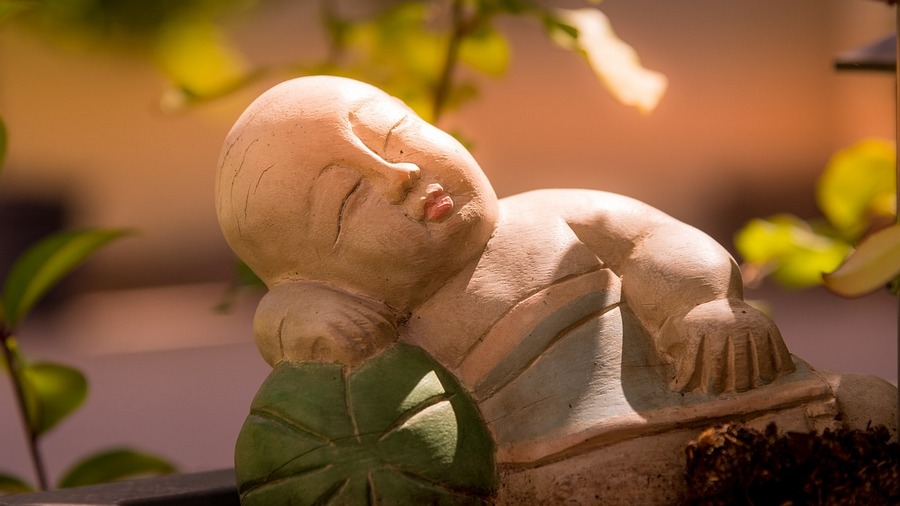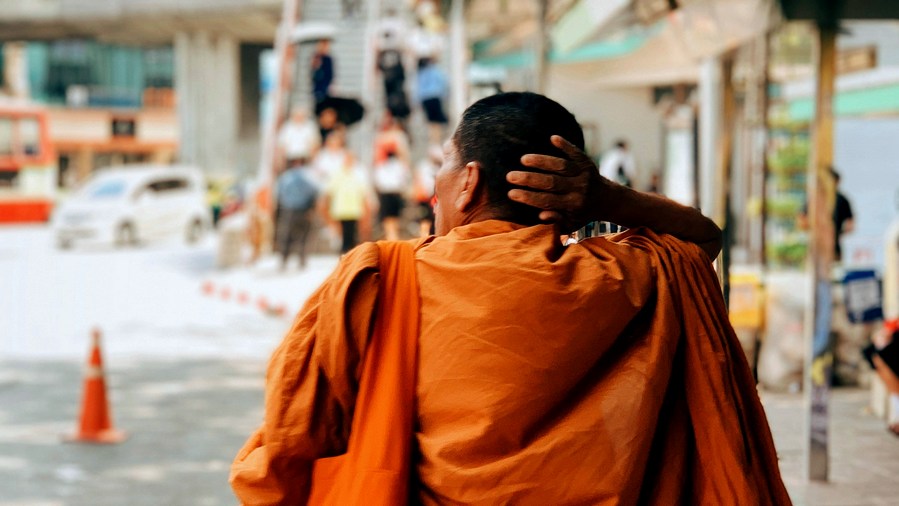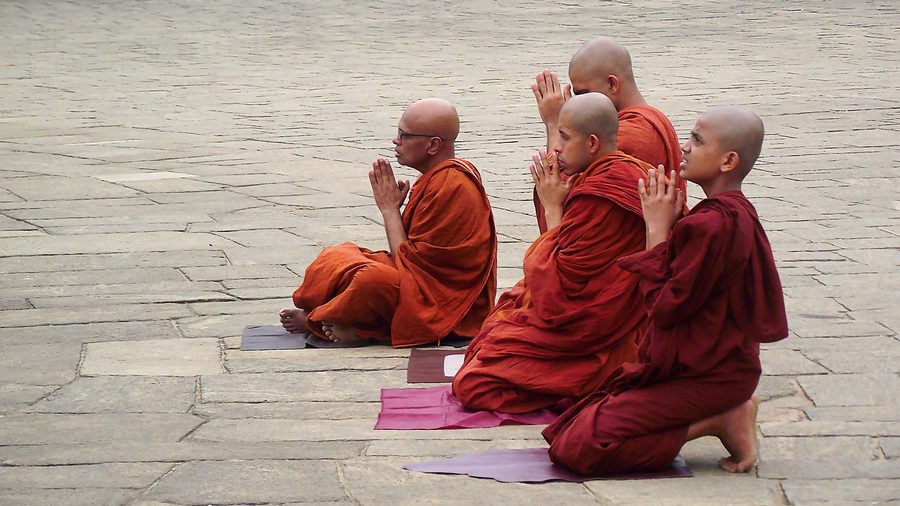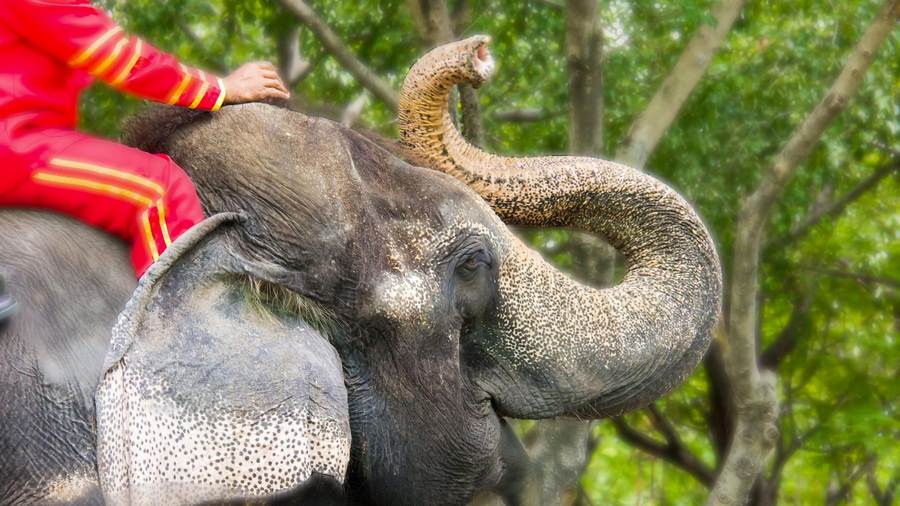[Note: the sutta today is a little longer than usual.]
“Bhikkhus, when a bhikkhu understands as they really are the origin and the passing away of all states whatsoever that entail suffering, then sensual pleasures have been seen by him in such a way that as he looks at them sensual desire, sensual affection, sensual infatuation, and sensual passion do not lie latent within him in regard to sensual pleasures; then he has comprehended a mode of conduct and manner of dwelling in such a way that as he conducts himself thus and as he dwells thus, evil unwholesome states of covetousness and displeasure do not flow in upon him.
“And how, bhikkhus, does a bhikkhu understand as they really are the origin and the passing away of all states whatsoever that entail suffering? ‘Such is form, such its origin, such its passing away; such is feeling … such is perception … such are volitional formations … such is consciousness, such its origin, such its passing away’: it is in such a way that a bhikkhu understands as they really are the origin and the passing away of all states whatsoever that entail suffering.
“And how, bhikkhus, are sensual pleasures seen by a bhikkhu in such a way that as he looks at them sensual desire, sensual affection, sensual infatuation, and sensual passion do not lie latent within him in regard to sensual pleasures? Suppose there is a charcoal pit deeper than a man’s height, filled with glowing coals without flame or smoke. A man would come along wanting to live, not wanting to die, desiring happiness and averse to suffering. Then two strong men would grab him by both arms and drag him towards the charcoal pit. The man would wriggle his body this way and that. For what reason? Because he knows: ‘I will fall into this charcoal pit and I will thereby meet death or deadly suffering.’ So too, bhikkhus, when a bhikkhu has seen sensual pleasures as similar to a charcoal pit, sensual desire, sensual affection, sensual infatuation, and sensual passion do not lie latent within him in regard to sensual pleasures.
“And how, bhikkhus, has a bhikkhu comprehended a mode of conduct and manner of dwelling in such a way that as he conducts himself thus and as he dwells thus, evil unwholesome states of covetousness and displeasure do not flow in upon him? Suppose a man would enter a thorny forest. There would be thorns in front of him, thorns behind him, thorns to his left, thorns to his right, thorns below him, thorns above him. He would go forward mindfully, he would go back mindfully, thinking, ‘May no thorn prick me!’ So too, bhikkhus, whatever in the world has a pleasing and agreeable nature is called a thorn in the Noble One’s Discipline. Having understood this thus as ‘a thorn,’ one should understand restraint and nonrestraint.
“And how, bhikkhus, is there nonrestraint? Here, having seen a form with the eye, a bhikkhu is intent upon a pleasing form and repelled by a displeasing form. He dwells without having set up mindfulness of the body, with a limited mind, and he does not understand as it really is that liberation of mind, liberation by wisdom, wherein those evil unwholesome states cease without remainder. Having heard a sound with the ear … Having cognized a mental phenomenon with the mind, he is intent upon a pleasing mental phenomenon and repelled by a displeasing mental phenomenon. He dwells without having set up mindfulness of the body, with a limited mind, and he does not understand as it really is that liberation of mind, liberation by wisdom, wherein those evil unwholesome states cease without remainder. It is in such a way that there is nonrestraint.
“And how, bhikkhus, is there restraint? Here, having seen a form with the eye, a bhikkhu is not intent upon a pleasing form and not repelled by a displeasing form. He dwells having set up mindfulness of the body, with a measureless mind, and he understands as it really is that liberation of mind, liberation by wisdom, wherein those evil unwholesome states cease without remainder. Having heard a sound with the ear … Having cognized a mental phenomenon with the mind, he is not intent upon a pleasing mental phenomenon and not repelled by a displeasing mental phenomenon. He dwells having set up mindfulness of the body, with a measureless mind, and he understands as it really is that liberation of mind, liberation by wisdom, wherein those evil unwholesome states cease without remainder. It is in such a way that there is restraint.
“When, bhikkhus, a bhikkhu is conducting himself and dwelling in such a way, if occasionally, due to a lapse of mindfulness, evil unwholesome memories and intentions connected with the fetters arise in him, slow might be the arising of his mindfulness, but then he quickly abandons them, dispels them, puts an end to them, obliterates them. Suppose a man let two or three drops of water fall onto an iron plate heated for a whole day. Slow might be the falling of the water drops, but then they would quickly vaporize and vanish. So too, when a bhikkhu is conducting himself and dwelling in such a way … slow might be the arising of his mindfulness, but then he quickly abandons them, dispels them, puts an end to them, obliterates them.
“Thus a bhikkhu has comprehended a mode of conduct and manner of dwelling in such a way that as he conducts himself and as he dwells thus, evil unwholesome states of covetousness and displeasure do not flow in upon him.
“When a bhikkhu is conducting himself thus and dwelling thus, kings or royal ministers, friends or colleagues, relatives or kinsmen, might invite him to accept wealth, saying: ‘Come, good man, why let these saffron robes weigh you down? Why roam around with a shaven head and a begging bowl? Come, having returned to the lower life, enjoy wealth and do meritorious deeds.’ Indeed, bhikkhus, when that bhikkhu is conducting himself thus and dwelling thus, it is impossible that he will give up the training and return to the lower life.
“Suppose, bhikkhus, that when the river Ganges slants, slopes, and inclines towards the east, a great crowd of people would come along bringing a shovel and basket, thinking: ‘We will make this river Ganges slant, slope, and incline towards the west.’ What do you think, bhikkhus, would that great crowd of people be able to make the river Ganges slant, slope, and incline towards the west?”
“No, venerable sir. For what reason? Because the river Ganges slants, slopes, and inclines towards the east, and it is not easy to make it slant, slope, and incline towards the west. That great crowd of people would only reap fatigue and vexation.”
“So too, bhikkhus, when a bhikkhu is conducting himself thus and dwelling thus, kings or royal ministers, friends or colleagues, relatives or kinsmen, might invite him to accept wealth … but it is impossible that he will give up the training and return to the lower life. For what reason? Because for a long time his mind has slanted, sloped, and inclined towards seclusion. Thus it is impossible that he will give up the training and return to the lower life.”
Read this translation of Saṁyutta Nikāya 35.244 Dukkhadhammasutta: States That Entail Suffering by Bhikkhu Bodhi on SuttaCentral.net. Or read a different translation on SuttaCentral.net. Or listen on SC-Voice.net. Or explore the Pali on DigitalPaliReader.online.
Or read a translation in Deutsch, বাংলা, Español, Bahasa Indonesia, 日本語, မြန်မာဘာသာ, Norsk, Русский, සිංහල, ไทย, Tiếng Việt, or 汉语. Learn how to find your language.







